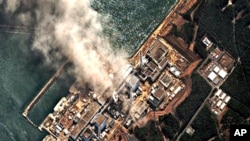Fears of a nuclear catastrophe in Japan are rising, as radiation leaks are at dangerous levels around a crippled nuclear power plant.
In a televised statement Tuesday, Japanese Prime Minister Naoto Kan warned that the radiation level around the Fukushima nuclear plant is "very high" and that there is risk of more radiation escaping. Anyone living within 30 kilometers of the nuclear plant has been urged to remain indoors.
Conditions are continuing to deteriorate at the plant, which lost power to its cooling systems following last week's 9.0 magnitude earthquake and subsequent tsunami that caused widespread damage in northeastern Japan.
Concern is particularly high regarding the plant's number 2 reactor unit. French nuclear safety agency ASN says a containment structure around the reactor has been breached, raising the risk that more radiation could be released.
The structure may have been damaged after fuel rods in the reactor were exposed to the air Monday, after burning through coolant faster than it could be replaced. When that happens, the rods become extremely hot and begin melting and releasing extremely high amounts of radiation.
Also Tuesday, the International Atomic Energy Agency said it was informed by Japanese authorities that a fire broke out at a storage pond for spent fuel rods at the plant's number 4 unit, and that radioactivity was released directly into the atmosphere at dose rates equivalent to 4,000 chest X-rays every hour.
All non-essential staff were evacuated from the plant before the fire was extinguished shortly before noon local time. Only a skeleton staff was retained to keep pumping seawater into three damaged reactors to try to keep the fuel rods from melting down with potentially catastrophic consequences.
Three other units have already suffered explosions which destroyed the outer buildings housing the reactors, the most recent coming earlier Tuesday.
Increased radiation has been detected as far away Tokyo, about 240 kilometers to the south, but officials said levels there are not a threat to public health.
Forecasts called for winds from the northeast Tuesday evening, which would blow any radiation in the direction of Tokyo. The winds were expected to shift later to the west and blow out to sea.
South Korea's Yonhap news agency says the government in Seoul has urged South Korean nationals to heed Japanese warnings and to stay away from the area around the troubled nuclear power plant. A foreign ministry official says about 2,700 Koreans are staying in Fukushima, but it is unclear how many are within 30 kilometers of the plant.
The U.S. Embassy in Japan has issued a similar advisory, urging U.S. citizens to observe all instructions given by Japanese authorities.
China is also working to evacuate its citizens from northeastern Japan. A Chinese foreign ministry spokeswoman says radiation levels in China are being closely monitored.





